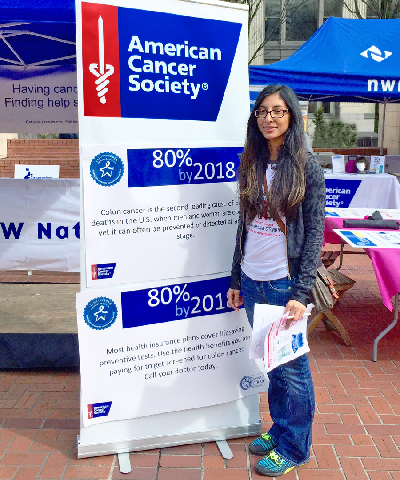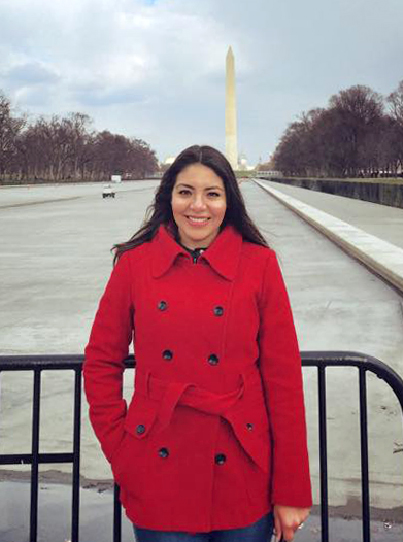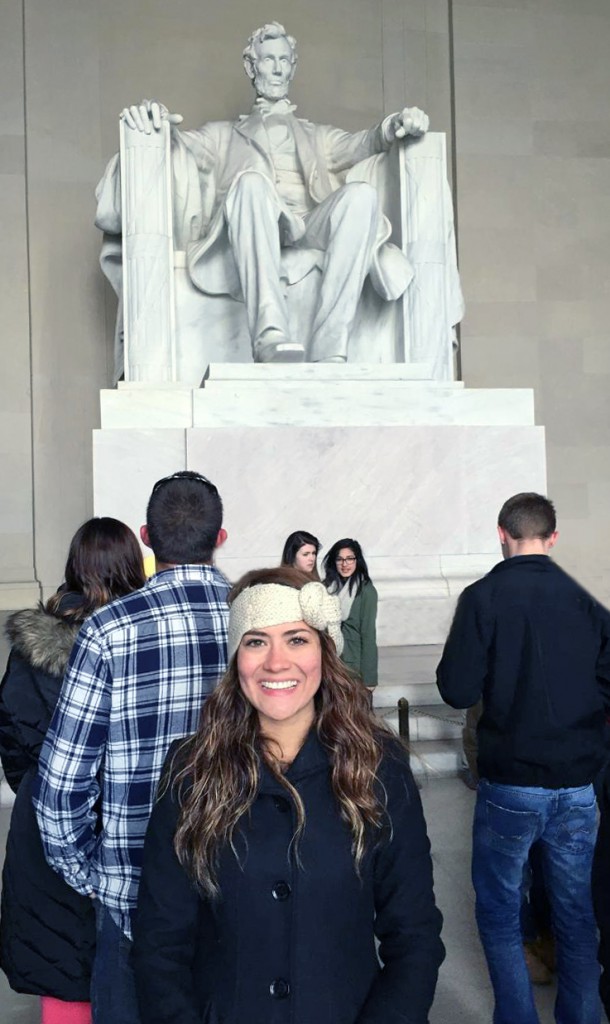Originally published April 10, 2015
By Laura L. Acosta
UTEP News Service
There and Back Again: With a gentle nod to J.R.R. Tolkien’s The Hobbit, this is the ninth article in an occasional series covering the off-campus experiences of UTEP students with study abroad, internships and externships, because what students learn outside the classroom is as important as what they learn inside the classroom.
As students at The University of Texas at El Paso returned to campus after spring break in mid-March, Cynthia Chacon, a public health sciences graduate student, set off on her own adventure to give back to a community in need.
Chacon was one of 60 college students from across the United States chosen to participate in the Gates Millennium Scholars’ Alternative Spring Break in Portland, Oregon, from March 21-28.

Service-learning opportunities such as Alternative Spring Break allow future health professionals in the UTEP College of Health Sciences to integrate their commitment to service into a rewarding career.
Started in 2009 by The Gates Millennium Scholars Program, Alternative Spring Break is a weeklong service event that allows scholars to provide meaningful service to a different community in the U.S. each year. This year the target area of interest was public health.
From 7 a.m. to 11 p.m. each day, scholars participated in different service projects throughout Portland. Chacon surveyed business owners in the city’s Historic Parkrose business district to find out about their interests and concerns. She collected data from business owners about Portland’s anti-smoking policies for the American Cancer Society and helped package 33,000 pounds of food at the Oregon Food Bank.
After being exposed to Portland’s diverse minority populations and the city’s nonprofit organizations, Chacon said the experience will help her grow as a public health professional.
“This trip is definitely going to help me be a lot more open-minded in considering alternative solutions to public health problems because I hadn’t really thought about a lot of other areas in the U.S. besides El Paso and the issues that we experience,” said Chacon, who was selected as a 2007 Gates Millennium Scholar her senior year at Clint High School. “That may sound silly because you learn about these social issues in class, but to actually be out there and see it firsthand is completely different. This gave me a sense of a bigger purpose that I have an obligation to give back.”
Established in 1999 with the goal of developing Leaders for America’s Future, the Gates Millennium Scholars Program is funded by a $1.6 billion grant from the Bill and Melinda Gates Foundation. The Gates Millennium Scholars Program offers high-performing, low-income students like Chacon renewable scholarships to fund their education starting with their undergraduate studies and continuing through the master’s and doctoral levels.
The Gates Millennium Scholars program also offers scholars leadership development opportunities, mentoring, and academic and social support.
“This trip honestly gave me a sense of purpose,” said Chacon, who plans to graduate in spring or summer 2015 and work in the public health sector for two years before pursing her doctoral degree. “Because of the generosity of (The Gates Foundation), I am attending school and it is my obligation to give back.”
Like Chacon, Master of Social Work (MSW) students Areli Guajardo and Viridiana Sigala are committed to improving the overall quality of life of the people they serve in the community.
The future licensed master social workers took advantage of a similar opportunity when they traveled to Alexandria, Virginia, to participate in the first Council on Social Work Education’s (CSWE) Minority Fellowship Program-Youth Master’s Fellows.
On March 30 and 31, Guajardo and Sigala attended workshops on children’s mental health led by experts including representatives from the U.S. Department of Health and Human Services Substance Abuse and Mental Health Services Administration (SAMHSA) and the National Alliance on Mental Illness.

“They talked about all the grants that the government is providing and all the policies and initiatives that they are funding to help youth in the mental health area,” Guajardo explained. “I saw this fellowship as a great opportunity to be trained in mental health with children because there’s a huge need for that in our community.”
Guajardo and Sigala are among 21 students from universities across the U.S. selected for the CSWE’s inaugural Now Is the Time: MFP-Youth Master’s Student Cohort. Funded by SAMHSA, the new fellowship offers financial and other support to minority students who are committed to providing mental health services to at-risk children, adolescents and young adults ages 16–25 in underserved minority communities.
“The Council on Social Work Education could not have selected two more accomplished and promising students” said Adam McCormick, Ph.D., UTEP MSW program coordinator. “The selection of these two students for such a competitive fellowship program is evidence of the brilliance, passion and capacity of the students in our MSW program here at UTEP. I am excited about the amazing things that these two students will soon be doing to address the mental health disparities here in the border region.”
Last November, Guajardo and Sigala were two of 13 students in UTEP’s Master of Social Work Program who received a $10,000 scholarship from UTEP’s Borderland Child and Adolescent Behavioral Initiative, which aims to develop and expand the substance abuse and mental health workforce in the Paso del Norte region.

As part of the initiative, scholarship recipients are trained to work with children, adolescents and transitional-age youth – those who are transitioning out of state custody or foster care – who have developed or are at risk for developing a recognized behavioral health disorder.
“Dr. McCormick has really inspired me to pursue a mental health career with at risk children, adolescents and transition-age youth,” Sigala said. “Children in this area are part of this population that we all want to help them, but in reality we treat more than prevent. This fellowship is going to offer me a strong support system and I know it’s going to be very beneficial to me.”
As an intern with Catholic Counseling Services Inc., Guajardo works with children, adults, couples and families. However, she said counseling children is very different than working with adults because there are several factors that she has to consider, such as the family environment or if the child has a developmental disorder.
This is the second time that Guajardo and Sigala shared a UTEP experience. They first met in 2013 when they were undergraduate students going through the University’s Minority Health International Research Training (MHIRT) Summer Institute. The program offers students the opportunity to participate in health disparities research in Panama, Ecuador and Costa Rica.
Sigala traveled to Costa Rica while Guajardo ventured to Ecuador. Last summer, Guajardo took part in the MHIRT program for a second time and traveled to Costa Rica.
Sigala and Guajardo also will accomplish another major milestone together when they graduate from UTEP this May.
“I think we’re going to be very well-rounded social workers,” said Guajardo, referring to the different opportunities they took advantage of at UTEP. “We were able to see different sides of social work, not just clinical, or research or policy. We got to learn a lot.”
Editor’s note: If you have a story or an experience you think would fit this series, please email news@utep.edu with the subject line: There and Back Again.